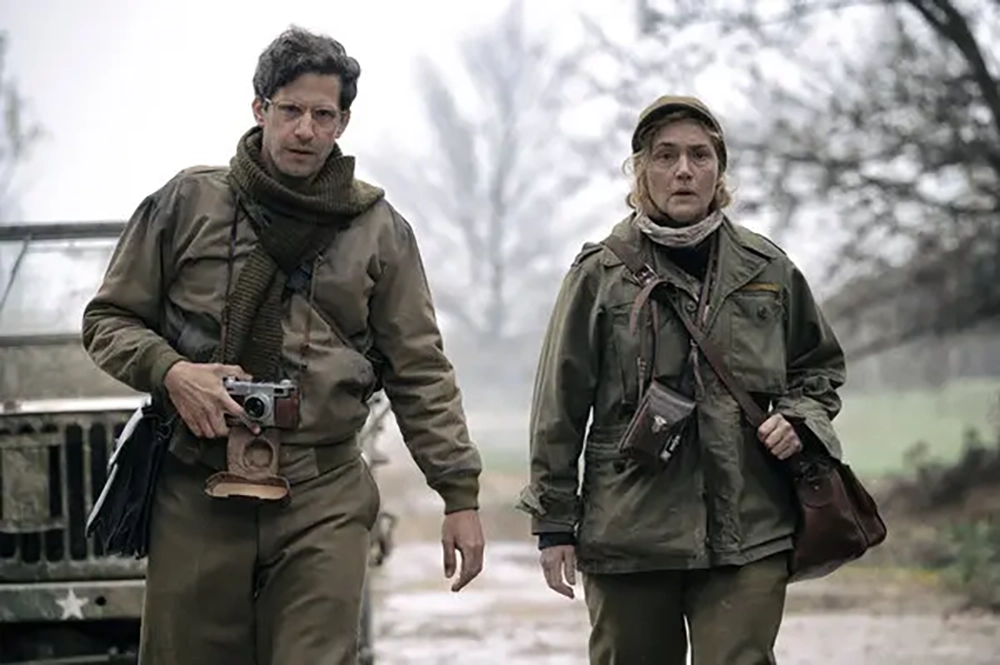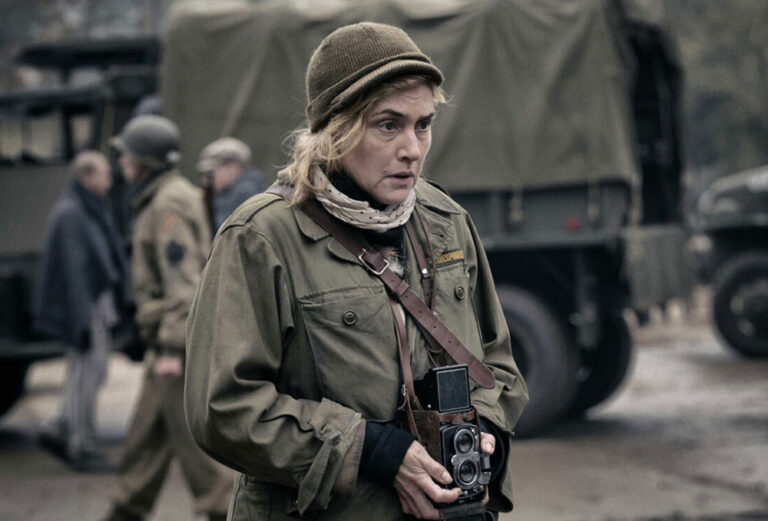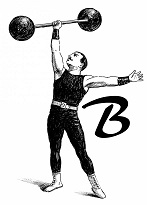Director Ellen Kuras’ background in political documentary filmmaking comes in handy with her “Lee,” her first feature. She manages to spark more discourse on a suffocating political scenario in which a ‘dangerous idiot’ (which Lee labels Adolph Hitler) astonishingly rose to power and popularity overnight. Considering the results of the recent U.S. elections, the movie also serves as an eery reminder of history repeating itself. “Lee” is ambitious in its resolve to showcase its determined protagonist’s journalistic prowess. It features scenes of Lee powering through debris left by the ongoing war to reach the frontlines, and then riding into Hell’s gates (Hitler’s headquarters/apartment) itself. The storytelling and framing of events reels viewers in, at once immersing us in the warzone with Lee. At times we feel we’re dodging bullets for a cause alongside her with such unease, I actually felt like I was watching everything unfold alongside her.
A Woman Thrust into a Man’s World
“Lee” also excels in capturing the complexities of war correspondence, especially via a female lens (Kate Winslet) as Lee is thrust into a world where a woman’s agency is revoked and misogyny abounds. This is true even at the military base she visits, later, and also witnessing firsthand the hostility and double standards of the male soldiers towards female civilians. Lee’s audacity in joining the ranks of men and having to rise above entitled, chauvinistic attitudes in order to do her job must be appreciated. Her passion lies in battling the patriarchy and the belittling ageist attitudes rather than simply leaving a mark in her field.
However, Lee is also at a crossroads regarding the limitations of her profession. This is subtly highlighted in a scene wherein she wanders into the living quarters of a female fighter pilot serving in the army—the only place from which she isn’t restricted—and is highly regarded for her work with Vogue. The pilot praises Lee for being an eye into the outside world and keeping the men and women in uniform entertained and informed on trendy, high fashion events.
But therein also lies Lee’s dilemma: while she was able to effortlessly coax gleeful smiles from her models while covering the Blitz, her journey into Dachau (where a majority of the Holocaust took place) is only fraught by bleakness. Shots of beautiful, living models posed ever so eloquently were now replaced by burnt faces of female prisoners of war. Their hair was often shorn off before public shaming for ‘sleeping with the enemy,’ as well as lifeless, decomposing corpses piled up on battlefields, in the ruins of once blossoming towns, refugee camps, or packed like sardines into cattle cars.
Winslet and Samberg Work Well Together

Lee feels even more distant upon her return to Paris. The city and countryside where she once vacationed and mingled with fellow artistes has also been taken over by oppressive forces. It is no wonder that the now elderly Lee (who is dictating her story to a keen listener in a desensitized fashion) has grown so cynical after her traumatic experiences in the war zone.
Through it all, Davy is by Lee’s side, never reeling in her ‘impulsive’ nature like her husband Roland Penrose (Alexander Skarsgård) or her editors at Vogue, unaware of the growing casualties. He acts as a beacon when Lee is in the dark, contemplating how to present her stories fearlessly to the public. Some stories may never see the light of day. Lee is forced to break more promises than she keeps, the sad reality of controlled media and press censorship. Davy says, “Worry about the true part first. Make it ‘good’ later” in one of my favourite pieces of dialogue from the film. It sums up journalism ethics and Lee’s motivations best. A polished article isn’t good if it isn’t factual to either side of the story. Many of the film’s memorable lines come courtesy of Davy, while Lee springing into action with gestures rather than words alone.
Ellen Curas, on the Other Side of the Camera
Kuras, who is primarily a cinematographer, having proved her mettle previously in another Kate Winslet-starrer “Eternal Sunshine of the Spotless Mind.” She’s gifted with a keen eye for detail, especially her inclusion of minute details, all while staging iconic/historical moments. One such re-enactment of a historic photo of Lee washing up in Hitler’s tub after weeks of travel—while photographing his war crimes—takes a toll on both her and Davy’s psyche. This moment is particularly of great significance and symbolism since it includes both a Jewish man and a woman having gained—rather than being granted—access into venues that they were previously barred from. When the opportunity presents itself, both Lee and Miller strike when the iron is hot, ensuring that the interiors of ‘institutions’ once considered as sacred to the Nazis are deliberately sullied.
Another haunting visual motif earlier on in the movie includes Lee witnessing a napalm bombing from right outside her hotel window. Subsequently, leaflets with powerful poetry written on them rain down from the heavens, as if to restore peace, even if it is temporary. The film then flashes back to one of Lee’s acquaintances exalting the virtues of the arts in combatting tyranny.
Sincere Energy and Emotion

While I was disappointed by the scant chemistry between Kate Winslet and Alexander Skarsgård, the rest of the cast still succeeds in immersing themselves into their roles. Despite a limited screen time, Marion Cottillard leaves an impression with her heartbreakingly-haunting thousand-yard stare as a member of Lee’s entourage of creatives who has lost her loved ones. She also barely escaped the concentration camps and is (quite literally) left picking up the pieces in a post-World War II scenario. Andy Samberg brings an amicable, sincere energy to the role of Davy. Also of note is Samberg’s powerful body language in a scene towards the final act as Davy is overwhelmed by the deaths of countless Jews in the Holocaust and breaks down in Lee’s arms.
Andy Samberg brings an amicable, sincere energy to the role of Davy.”
“Lee” also pulls focus to the believable dynamics between Lee and Davy, and here Winslet and Samberg’s platonic, heartwarming chemistry doesn’t disappoint. Even if Lee is initially grouchy and cold-hearted towards her male counterpart being sidelined from covering the war due to her gender, she later she grows to treat Davy as an equal.
Yet Can Sometimes Feel Disjointed
Criticisms of “Lee,” however, come in its pacing and length. The first half drags with a narrative that just doesn’t flow. As a result, the movie can feel quite disjointed, much like vignettes that aren’t altogether well established or coherent enough. The pacing of its first act too slows it down and the tone is often bordering on pretentious until one learns to love Lee for her fearless, feminist attitude. Fortunately, the action picks up as Lee heads to the frontlines—shipped off with only one piece of rather jarring advice—to write her own obituary and mail it in to her editor as a formality to be completed by all war journalists. The second half more than makes up for that tedium-inducing first act.
Regardless of the flaws that compromise its structure and lead to it coming across as a mixed bag, Lee’s story is nevertheless one that ought to be told rather than pushed to the far end of a filing cabinet. It is a pertinent one, as well as a reminder to journalists to keep their integrity and resolve intact, as not everyone has a voice to speak up against atrocities, nor a platform… particularly civilians. With war correspondents and journalists trapped in harrowing conditions along with citizens—especially in Palestine while the rest of the world watches on helplessly—”Lee” is one movie that feels even more timely.



